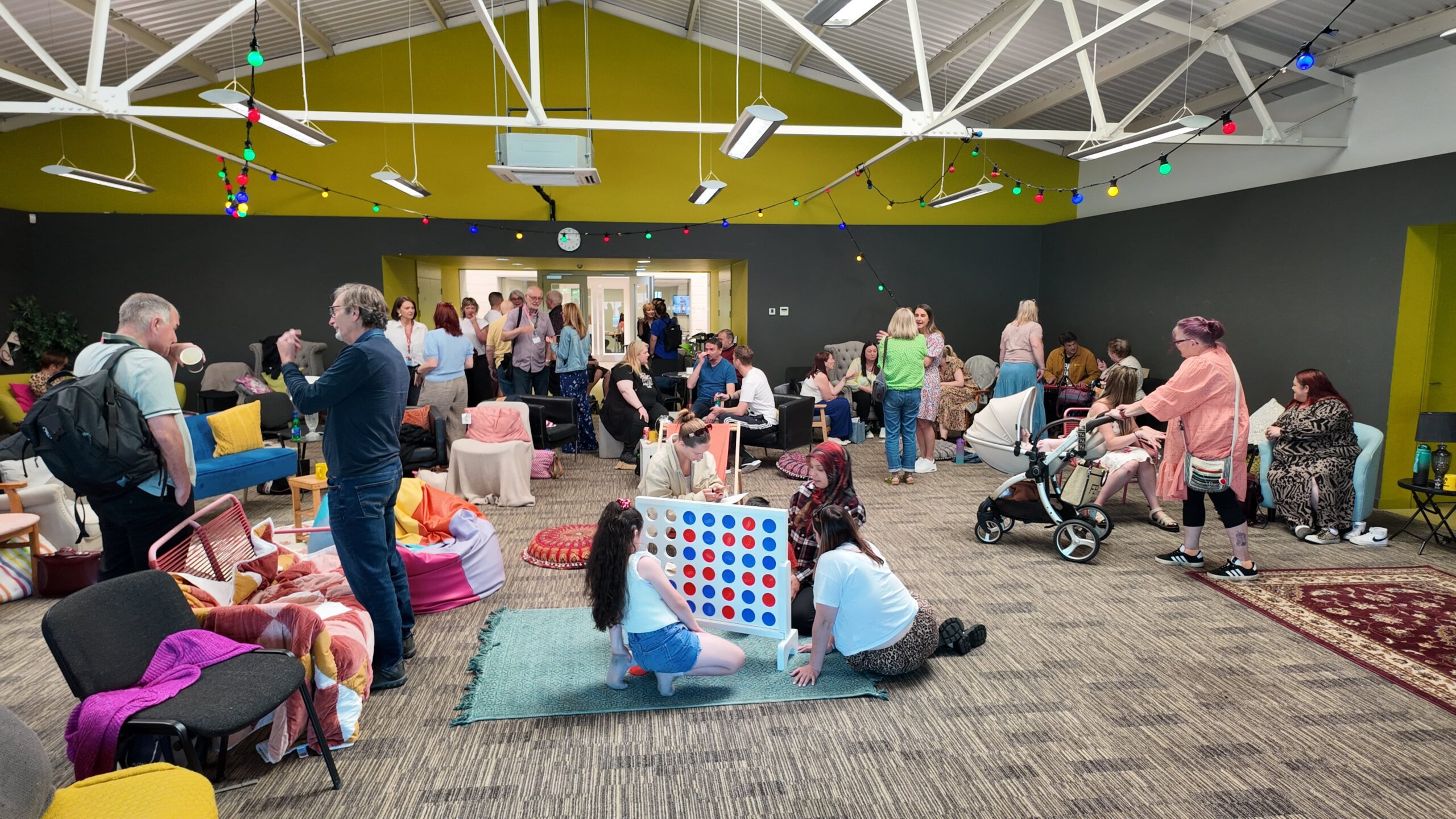
Festival of Learning fireside chat
On the morning of Monday 12th May 2025 we began the Festival of Community Led Learning with a fireside chat. With hindsight, with the good weather and deck chairs in the public living room perhaps we should have named it a beach picnic!
The premise was simple – to centre local people and share a story of the power they’ve been growing through care fuelled collective action. And, to invite in our good friend Cormac Russell to listening deeply and share what struck him.
For this listening and learning event we invited a number of community members who had been involved in cultivating play in the community. We could have chosen many stories but we know how important play is to local people. It’s the foundation from which all the local work has grown.
Angela and Gill hosted the conversation inviting community members to speak of and to their experience of taking action in the place they call home. At the centre of the conversation were:
Lisa, who we’d met at the pub during the days of Well Good socials. We’d discovered her love of play, her community rootedness and the fact that she was a natural connector, she knew everyone! She now works as a Community Builder with Northern Heart and Soul.
Ava, aged 8, a Playbox campaign group member and vote counter at Community Cash events.
Amanda, Mum to Teddy and Annie and a member of the Playbox campaign group.
Michael and Lenny, two 14 year old young men who held their own holiday activity fund budgets and have successfully grown local enterprises in the community.
Jo and her 8 month old daughter Evelyn. Jo has supported the growth of the family activities club, contributes to a women’s wellbeing group and has offered sound baths to the community.
Janine, at the time of meeting her Janine worked for the Council Play team and came to work alongside the community with the Playbox.
The story started with Well Good Socials, opening up some no fixing, no agenda local space where people could come together rooted in what’s strong rather than what’s wrong. Over the course of the first few months as we chatted together and hosted some specific conversation groups we began to learn how important children and play are to the local women. Through conversation we also began to realise that adults had stopped showing up in the streets and that the community itself needed to rekindle that function. There was community ownership, a feeling of ‘we can do something about this’, it’s within our power and control. This led to the group of women deciding to organise something themselves – summer holiday play days. A budget of £200 was provided – enough to buy basics and insufficient to bring in others to run it for us. We had to do it ourselves, disrupting the capitalist practices we’ve all become accustomed to. At the same time we submitted a freedom of interest request to see if the community was getting it’s fair share of the financial resource that was coming in from central government. The proximity of a very large youth centre often over shadowed the hyper local community offer. Young people were seen as the business of youth workers rather than being central to community life. They should go over there, rather than be here in their own place.
Lisa talked of her experience of pulling something together, coming together as a community, what that felt like – to say, yes, we’ve done this ourselves and then celebrating with a trip at the end of summer. It was the first time for a long time that they’d all pulled together themselves and that felt good. No one was patting them on the head, no one was taking credit for their achievements in order to justify their own existence.
Everyone enjoyed it and the women continued to organise things for themselves at holidays, using the skills they had.
By the second summer of community play we managed to hire a Playbox from Playful Anywhere. This brought a whole new crowd to the park and you could feel the vibe of ‘we want more of this’.
Lisa shared how neighbours got to know each other more. How she talked with people that she’d live close to for twenty years for the first time, how people who she’s never seen play out with their children before joined in, and, how the community experienced joy together. You can read more about the playful surprises here.
Ananda shared how seeing what was happening and how her children enjoyed it made her feel like she wanted to get more involved and join the campaign. How her children made friends with children that they may never have become friendly with.
Angela and Gill shared how important it was that the Council adopted a flexible approach to the Holiday Activity Fund monies so that families can play together to combat the unfairness that exists when poverty is present. Whilst not negating the need for enrichment activities middle class families enjoy time together during holidays whilst those experiencing financial hardship often have children removed from community so someone else can play with them and feed them. It’s sometimes offered under the guise of helping out but if not alongside peer support it is merely a transaction that helps less than we think it does. It can result in families missing out on the joyful and often therapeutic experiences that are a necessary part of both family and community life. It can also impact on the childs view of the function of a parent. And the parents confidence around fulfilling those functions.
At the end of summer the children decided to create a campaign group. They wanted a playbox. And they got one, within 12 months too. Thanks to their organising and campaigning ability, the generosity of community members, GreenMount Projects, and, Council teams acting to speed up a licence process the Playbox opened at the end of Summer 2024. The first asset to be fundraised for and owned by the community. In the bigger story, the long term dream of community ownership and wealth building this milestone will become to be seen as a very important moment.
In this second summer we noticed teenagers showing up and asking for money off their parents, £10 a time. We realised that many would qualify for Holiday Activity Fund monies and the extra financial cushion wasn’t reaching the pockets of local families. The young people didn’t want to do what was on offer and when you’re young independent time with your friends and peers is important. Who wants a programme when you can have a life? Cycling freely through the woods with enough money in your pocket for your dinner.
So we approached Chris Essex Crosby at the Council with an idea. We wanted to support young people to be independent and manage their own budgets. We think it’s a better pathway out of poverty, rooted in solidarity and justice rather than charity.
Lenny told us that Michael asked him and a group of people if they’d like to do it and they all came to Community Corner and put their ideas down and started costing it all out. How much food would be, entrance etc.
Michael talked of his experience, ‘We got the money and we organised a trip to an indoor skatepark and the food. We went to the cinema and had everything paid. We had our gym memberships paid for in return for helping out at the Playbox. And we used to go the gym every morning at 7am.‘
Lenny added, ‘We thought it was really good and we’d do it again. And it was good because we were trusted with the money.’
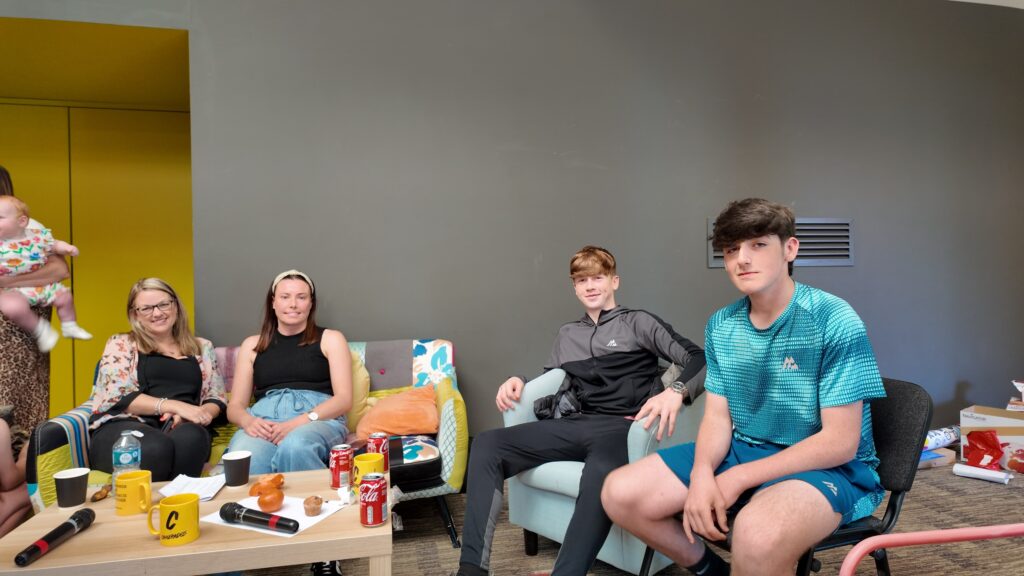
We talked about trust and how we decided on this group of lads. How do we cultivate trusting ways if we are to redistribute and shift power and resource?
Michael shared his story of being a citizen and community member. That he’d been to community cash and secured some money for some gardening equipment and then started doing some jobs to earn himself some money.
Michael was trusted as we knew he contributed to community, he’d been trusted with cash before and was connected to people that we knew. We had a connected adult, a local parent, which helps to keep us all safe. Someone who would check in with the lads when they were out doing their own stuff.
We realised at this stage in the community story that we were beginning to know what we can do and know what we had locally to help with this. We knew we could do a lot ourselves and we also knew we couldn’t do everything. We were ready to look at how support services might be able to add value and help us. This is important, we did not rush in with outside help. There were no play days surrounded by services in gazebos looking for customers and clients, holding questionnaires and clipboards or getting ‘closer to communities’ as part of contract requirements. We didn’t want anything or anyone to get in the way of the community restoring some natural functions between neighbours.
Based on knowing what might be useful we invited the play team to come alongside us in the community. To work with us at the Playbox to train local people as play stewards so they could come and open the playbox. We’d tried to talk to the Council about this with no luck. And it just so happened that Janine, a member of the Play team, turned up at Grass Roots of Wigan wanting £67 for a trolley to do some work with young women for a CIC she was growing. So we cut out all the managers talking to each other and just said, ‘do you think there’s any chance you could come and give us a hand at the Playbox?’
Janine shared her experience.
‘I got my trolley and I went along to the Playbox. My background is in play at Norley. It was just amazing to see what they had done in the community. Walking in you get such a really warm feeling when you see all the parents, and grandparents and the young people coming to set up the Playbox. And in a way it was like going back in time to when it started at the adventure playground. As I got to go more you could see the sharing of skills. I don’t think you realise how important play is. Seeing the family dynamics and what the children are learning. It’s just lovely.”
Angela added that another thing the Playbox does is enable us to encourage people from different places and cultures to feel welcome and take part. It’s one strand of an intentional local plan to provide spaces and opportunities for people from different backgrounds to get to know each other and experience fun and joy together.
Gill added that when we tell this story we talk about how important it is for families to be together and it’s also really therapeutic for families. If you’ve had an argument in the morning, experienced some stress then doing something nice and having a laugh together dissolves some of that. When we divide and split then it still festers. Play in the community enables families to work through it.
Gill raised the importance of the peer support that’s grown from parents beginning to self organise. The conversations that naturally happen, parents who have children with additional needs who are struggling to get a diagnosis supporting each other and complaining together about life with teenagers, all giving and receiving peer support in very mutual ways.
Jo, a community member and a member of the local organising circle said, “I’ve noticed a lot of Mums coming together and just talking about things together makes you think you are not alone and that is beneficial.’ She said that when she first came to Wigan she didn’t know anybody and lived here for 5 years before she managed to make friends and find peer support for herself and offer it to other people. She talked of the friendships that have formed for her children in the local community as a result.
Jo had been actively involved in the family activities club with Lisa and they shared the journey. They talked about failure and letting things go so that something new and deeper can emerge. Lisa said, ‘the parents at the activities club were just not getting involved, letting their kids run riot. So we stopped it. Then they all missed it and wanted it back and now everyone gets involved.”
Before inviting Cormac to share his reflections on the story that had unfolded Angela summarised with three points that have been important to this story.
1. Community members have been baked in as producers of community life. There was no fixing. There was no rushing in and bringing services in. We were patient and slow in order to uncover and connect the treasure that we knew was already there.
2. Once we get to the stage when we know what we’ve got between us and are acting collectively as a community we can begin to articulate what we need from other people in terms of helping us out and invite others to join. This is the stage that we invite partners and collaborators in. Doing so too early causes harm.
3. At the right time, this enables the function and roles of community and alongsider become clear and we can begin to work out how we can make the best use of resources together in ways that neither harm, displace or replace all that is waiting to be revealed in community life.
Cormac joined the event at this point to share what had struck him from listening in.
We then invited a number of people to offer some reflections.
We asked Chris to share his experience of being alongside the community and responding flexibly. Chris reflected on the importance of analysis of the freedom of information requests.
Angela talked honestly about the surprise she felt about being here today and so many people coming. She said, “If we’re really honest when we started this work 5 years ago unfunded and using monies from my training business to get it going we thought that people really hoped we might go away or run out of money. Not everybody, there were lots of people cheering us on. People would send messages saying, ‘great blog’, but no one would like it. It’s really good to see how things have opened up in the borough. Had we not had support from GM System Changers who believed in what we wanted to do and said here’s a pot of money, do what you think needs doing with it, then we certainly wouldn’t be here today.”
Angela invited Carrina who has been stewarding the Greater Manchester System Changers work on behalf of the Lankelly Chase Foundation to take up the microphone and she offered some learning. She advised commissioners to let go of control. How do we encourage multiple perspectives in decision making? How do we shift power? Instead of power over how do we shift it back to power with. So there’s a lot of unlearning that we all have to do to be able to step into feeling we have that agency without feeling ‘crikey I’m going to be doing something wrong.’ And also really amplify and lift up this idea of learning, so what do we all need to unlearn? And that’s how Lankelly has been funding. The biggest shift is that we all want justice and not charity. Let that sit with you all. We all want to flourish and thrive and be in conditions where we can be in community with each other. Really hold on to that. And be driven by the idea that people who are closest to the problems are best placed to find the solutions with institutions alongside as they can bear the risk that communities shouldn’t have to take. Not to be driven by risk, but ensuring that those who have the luxury of being able to absorb some of that risk are involved. Taking a different view for grant making that encouraged those who didn’t usually make bids to access the participatory grant making process through the Spaces Fund was tremendously important with grant making rooted in creativity and led by working class women and young people, predominantly of colour yet not exclusively.
Ava spoke and told us about how she counts the votes and lets people know they have money. Ava told us that she has pitched at Community Cash for the playbox and also at Easter to pay for some bunny costumes and eggs so that they could deliver eggs on Easter Sunday to raise money for a trip to Gullivers world. She’s also made loom bands and set up a stall in her street.
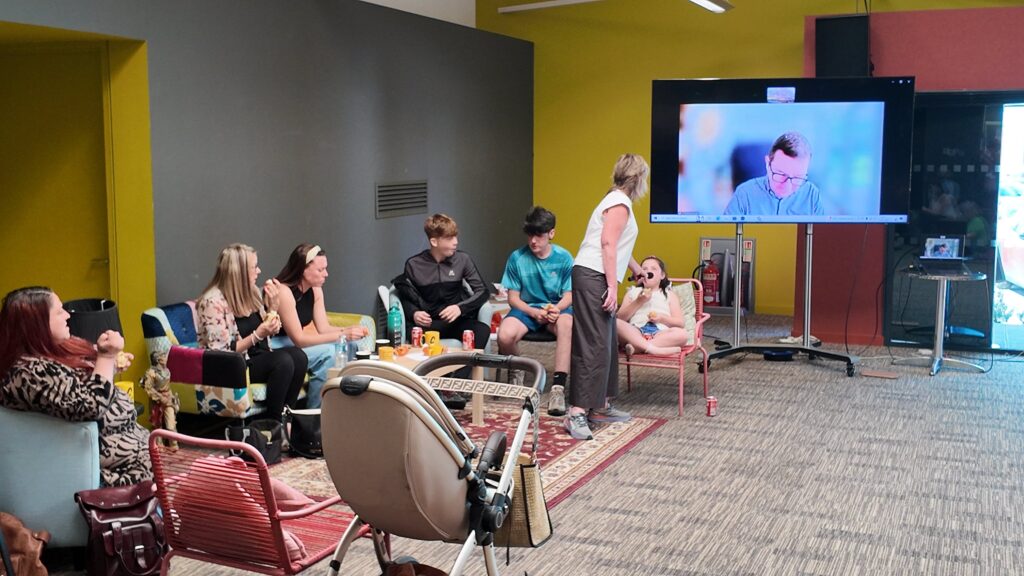
Amanda told us that the biggest thing she’s learned from listening to people talking today was when Lisa had said the craft group failed and parents were just letting their children run around and then it started back up again. It wasn’t really a failure, it taught them a big lesson because actually the power lies within the Mums, Dads and people who live in the community and it actually started back up again and in a better way and that’s the whole point of what the community is doing.
Angela invited Lisa to speak about how we’d met her intially in the pub and then we’d realised what a community connector she was and how much social work and youth and community work the community was actually doing on Beech Hill estate. Now Lisa works at Northern Heart and Soul which in itself brings both great joy and challenges when you work where you live.
She said, ‘I’m just seeing at the minute, everyone pulling together, everyone being there for each other. We have a good group of women who meet up every morning after school and support each other. We listen. It’s always nice to just have someone who will sit and listen. The families are coming together. It’s quite surprising really because when Angela and Gill first came into the community I was very much, it’s not going to happen. And now, the difference. And it’s not just me, everyone sees it. It’s like yesterday we had a party in park. We had 400-500 people and a lot of people came down from the Beech Hill estate. Everyone is getting involved and doing their own little bit. It’s just lovely to see.’
Clare told us about how she lives on her own, and that we’ve heard a lot about the young families but it’s not just young people. ‘I’ve been brought into the community and I just feel very emotional that I’m part of it now. And if I don’t go for a while they’re ringing up and seeing what’s up and often there is something wrong with me. And I just want to say thank you. I’m living there, I’m on my own and I’m as much a part of the community as if I’ve lived and grown up there all my life.’
Phil shared how humbling it was to sit and listen to people talk passionately about peer support.
We passed the mic back to Cormac to offer some closing reflections and he shared the shifts he’d noticed.
Such striking words. ‘This isn’t about a few programmes that bring a little relief from poverty this is about changing the social order. It’s a marathon that we have to run to the rules of a relay race, where we win only when the last person crosses the line.’
After Cormac left us we spent some time reflecting together.
Dionne of Complete Kindness shared some reflections and how important it is to connect people who are doing this work together for shared learning.
It can be so difficult for community people to lead this work. The power and control is so often with an organisation.
Jay of Sunshine House wanted to touch on humility and connection, and how he felt that the community had build something that we can all model. ‘I know about action. If we don’t act ourselves then we’re not going to get anywhere. Michael setting up his own business, Lisa and the craft club. That’s to be applauded. Connection is protection.’
Alice of ReMade Wigan and a director at Northern Heart and Soul spoke of the importance of resourcing communities in their own right.
Maff of Camerados shared the Camerado principles before accompanying Clare as she closed the morning with song, ‘Will Ye Go Lassie Go.’
If you want to hear more from many of the community members who spoke today and the experience of others in Springfield, Beech Hill and Gidlow you can listen to their Ripple Effect Mapping stories here.
The next blog in this series will share the learning from the Ripple Effect Mapping Action Learning Project which was the focus of a workshop at the Festival of Learning.
With deep gratitude to everyone who helped make this happen and joined in on the day. Together we experienced community.
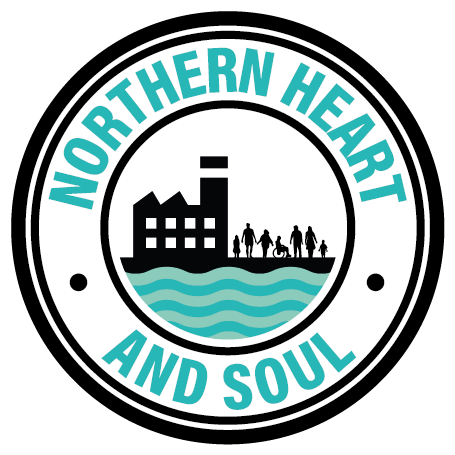
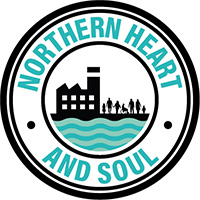
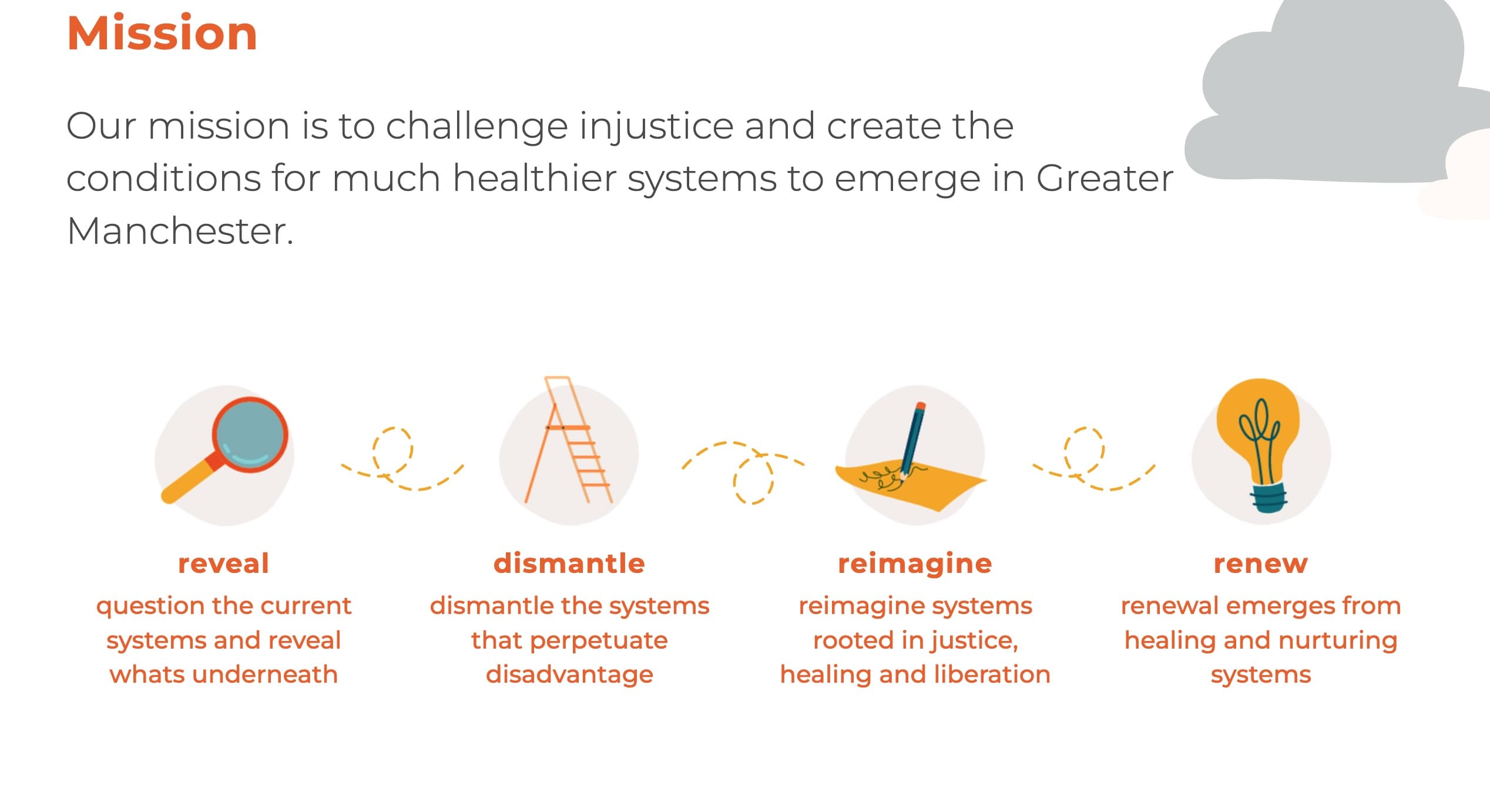
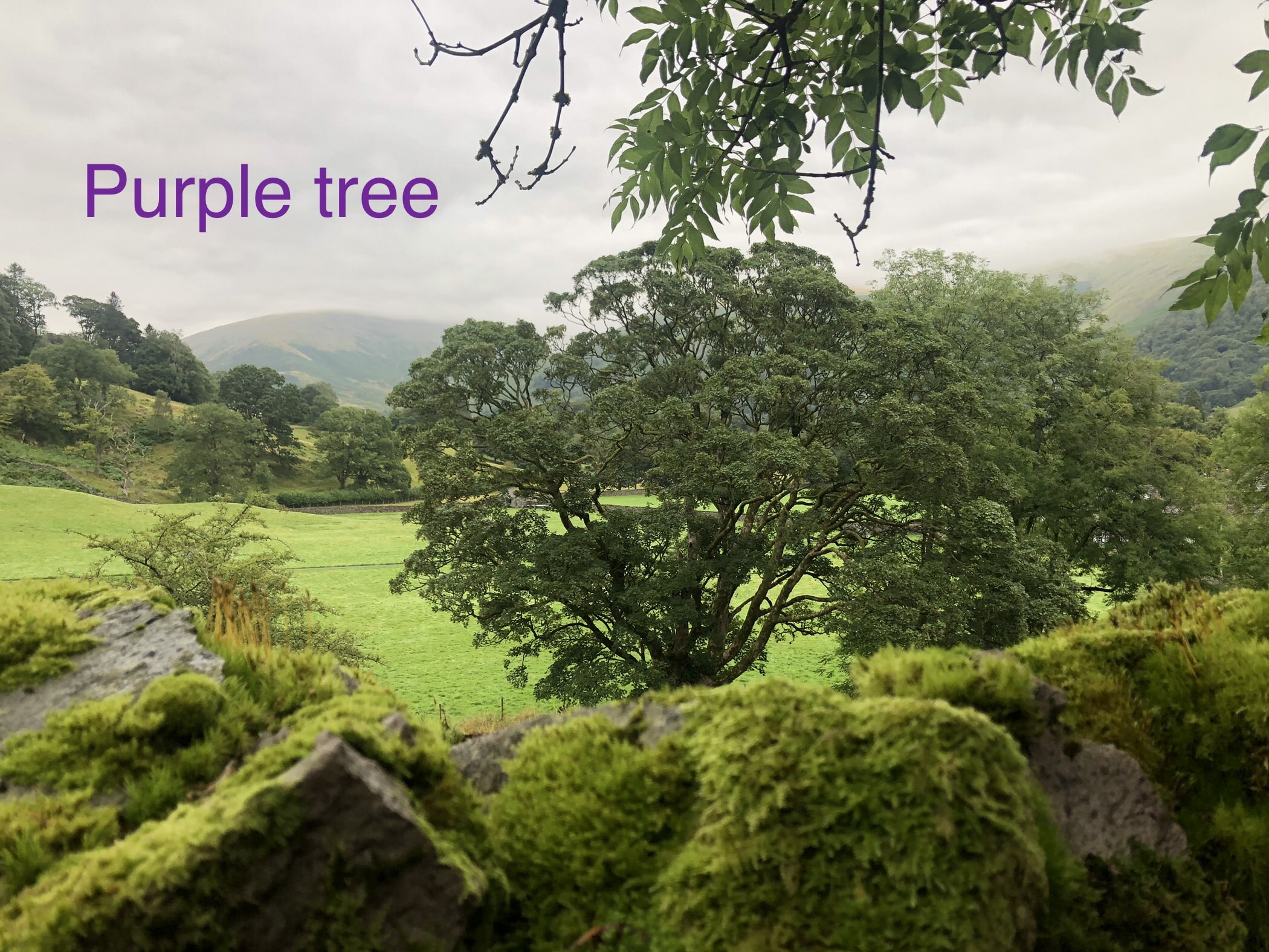
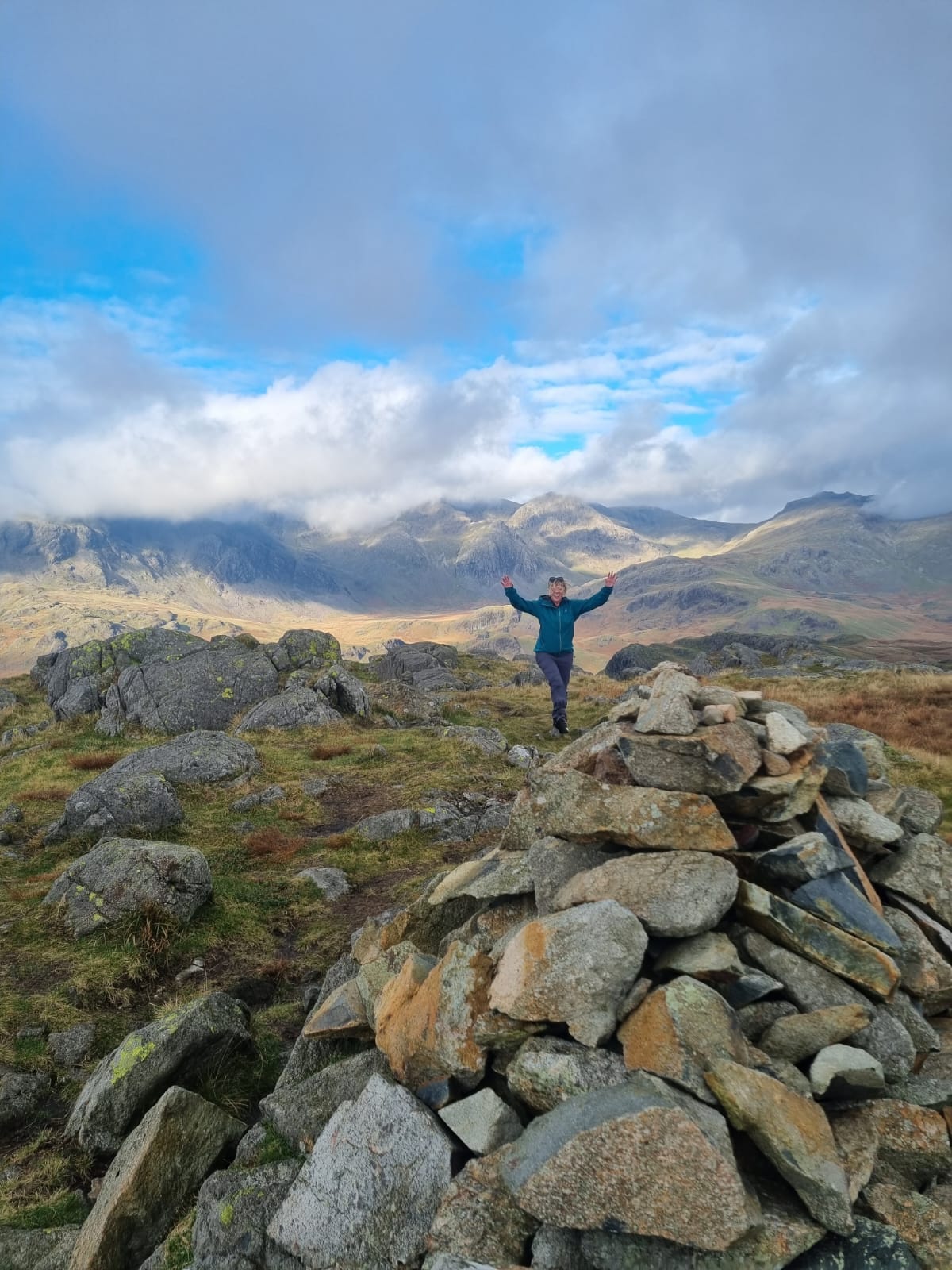
Leave a Reply